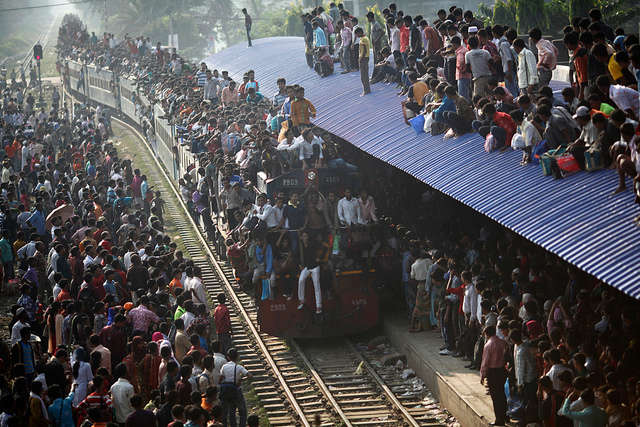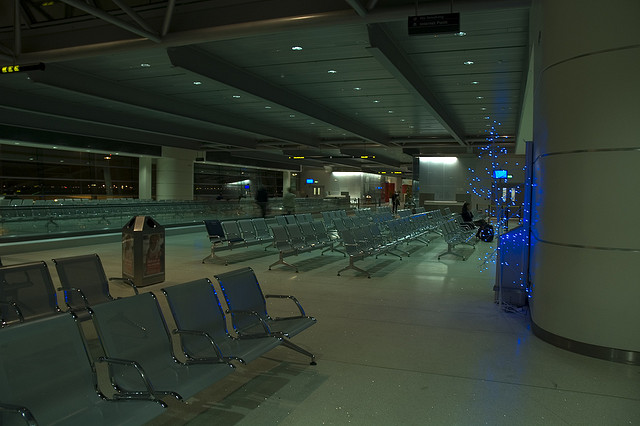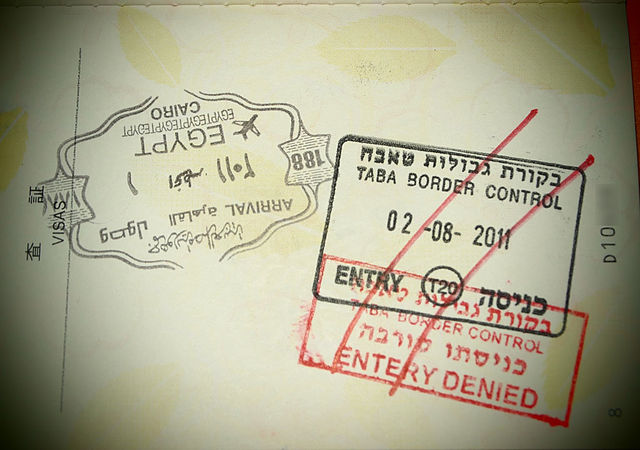There are also those who plan every single detail, making a meticulous plan for their trips. There are those who buy their first flight and just take it from there, figuring everything out once they’re on the road.
Then there’s that golden unmarked middle ground between those neurotic planners and hippie wingers. Middle-grounders book the cheapest flights in and out of a country months in advance, making up the rest in between. They print out a list of possible sights and improvise the route, finding hotels as they go rather than arduously plotting each night.
But sometimes, making plans is important, and when you always try to wing it, problems can arise.
If there’s one thing we learned on our recent four-month round-the-world trip, it’s that if you can’t find a restaurant, you’re hungry until you get to one; if you can’t find a hotel, you’re temporarily homeless.
Some things are best taken care of before a trip has started, or at the very least, a few days before you assume that the bus you want to take will surely have at least a couple seats available, right?
It’s not always safe to avoid research and assume, “Ah, whatever, it’ll be fine.”
Here are six reasons why winging it doesn’t always work.
1. Trains book up

There’s no better way to travel than by train: they’re romantic, inexpensive, comfortable, leisurely and spacious. The problem is everyone knows it. Who figured the Beijing-Qingdao Express would fill up on a Sunday evening? (Answer: Chinese people; not me.) Who’d have guessed that booking an Indian train ticket directly through the rail company online would demand foreigners scan a copy of their passports and email it to the company who then sends them one of two passwords they need to activate an account to book a train only to discover, oh, it sold out three months ago? (Answer: Nobody. That’s why the Indians all bought their tickets three months ago.)
As a general rule, always check your destination’s railway website before arriving at the station. Even if you can’t purchase online in advance, you can at least double-check your route.
There are ways out, of course. Travel agents swing to the rescue in these drastically overpopulated countries by snagging up a whole whack of extra tickets to sell to whimsy foreigners at inflated prices. But if you know what day you’ll be travelling, why not save your money and get the job done in advance? You’ll have more time to enjoy exploring the country, rather than exploring the railway station waiting room and trying to figure out on the fly how everything works in a foreign country.
As a general rule, always check your destination’s railway website before arriving at the station. Even if you can’t purchase online in advance, you can at least double-check your route. For example, anyone around Thailand last autumn knows that the train north past Uttaradit to Chiang Mai was down for construction. Taking the shuttle bus is fine, but not if you had paid in advance for a hotel that night.
2. Hotels aren’t everywhere

Intimidated by Tel Aviv’s monstrous hotel costs, we hitched a bus to neighboring Rishon LeZion, a significant city with a population of 230,000, which was closer to our next day’s destination anyway. Score, right?
We wandered downtown – they had shops, they had tourists, they had shopping plazas and buskers. But hotels? We asked around, and the consensus was clear – there is not a single hotel in Rishon LeZion. We were baffled and had to backtrack all the way to Tel Aviv.
You can’t always predict where hotels will be. In most Western countries they’re smattered everywhere—you stumble upon them on highways and across downtowns—and East Asian cities in South Korea and Japan boast cheap motels as frequently as corner stores. But you can’t always guess right, there won’t always be a café with WiFi for you to double-check what’s nearby.
We asked around, and the consensus was clear – there is not a single hotel in Rishon LeZion. We were baffled and had to backtrack all the way to Tel Aviv.
Asking strangers about this is harder than asking for a good restaurant recommendation. Locals wouldn’t know where hotels are, let alone which are good or cheap. Cabbies may know a few, but you’ll have to settle for their judgment. You might wake up the next morning and find a hotel for half price one block away.
This is admittedly less of an issue across Southeast Asia, where every city has at least a small collection of guesthouses that tip tuk-tuk drivers a commission on every room they fill. This can work to your advantage, because you can reject hotels willy-nilly, and the driver won’t get paid unless you’re satisfied.
3. Opening hours can be funky

Our flight was booked for 7 a.m. from Qingdao International. We arrived there at midnight. When the security guards allowed us to sleep until 1:30 we assumed we were in the clear—until they woke us up and informed us the airport was closing and we had to either pay $80 for five hours in a nearby hotel, or sleep in the 24-hour KFC down the street.
Two bowls of chicken congee later, we uncomfortably dozed off.
Many minor international airports (and almost every domestic one) will shut down at a certain hour. Never presume the 24-hour status of anything. Iceland’s Keflavik International, a good hour from Reykjavik, is notorious for its signs admonishing travelers seeking to set up a night’s camp. Saving hotel costs by heading to an airport early is a fine idea if you’re willing to rough it, but do your research first. Sleeping In Airports may be the definitive guide on this subject.
Never presume the 24-hour status of anything.
Meanwhile, many Europeans may already know this, but museums go on holiday each Monday. There’s nothing worse than showing up ready for a leisurely day of modern art and discovering that, had you at least once viewed the museum’s website, you’d have known it was closed.
Timekeeping in general is important to keep track of on the fly. You can’t always predict when you’ll need to do your laundry, but you can calculate when the place closes and whether they’re open on weekends. I nearly lost my pants in Bangkok because of that.
These are exactly the kinds of situations that could be easily avoided by a quick Google search even the night before. No reason to leave plans to the day-of when your plans depend on the officiousness of others.
4. Unforeseen festivals

My father and I drove 18 hours from Toronto to Halifax some years ago, stopping for the night at a roadside hotel in Moncton, New Brunswick. Every one we popped into was full up because of what I remember to be a fairly significant Maritime country music festival. We were baffled, and wound up spending more than we’d wanted to on a towering downtown hotel.
Festivals are easy to spot in advance: every city’s website will advertise it. If you show up unprepared, they can mess up your daily budget because hotels often take advantage and jack up the cost. They can also screw with your itinerary by causing unexpected road closures and changing store hours, to say nothing of the unusually busy public transit.
On the plus side, if you know about a festival in advance, you can maneuver your agenda to fit in whatever event is going on. You’ll rarely find a better chance to understand a culture than checking out its celebrations. Even if you don’t know in advance and are caught unawares, stumbling upon festivals can have a magical feel about it—in Manila, for example, we happened upon a free dance show in Rizal Park, and sat amongst the picnicking families against the sunset, eating yam rolls and sliced mango. It turned out to be the highlight of the day, but there’s no situation wherein we’d have been worse off for knowing about it beforehand.
5. Bureaucracy won’t let you

It’s one thing to imagine yourself traveling carefree across the world, leaping over borders and defying cultural norms.
It’s another to be rejected at the airport because your passport expires in under six months.
Visas and passports are the most fundamental bases of traveling—and yet, people still forget to renew their booklets before their trip, or don’t realize that you need an advance visa to visit India, or forgot that Laos charges Canadians more than Americans for visas-on-arrival, or didn’t realize that the universal “passport size” doesn’t exist.
If you read nothing else in advance of visiting a country, then at least read their entry requirements, and for how long you can legally visit.
Border security is serious business. Don’t know the drug or alcohol laws in Indonesia? Read up before you go. Didn’t check that you needed a round-trip ticket to enter the UK? Some security guards are strict and can legally deny you entry on suspicion alone. And if you forgot about that Israeli stamp in your passport, most of the Middle East is off-limits now.
Not everywhere is as lax as Europe’s Schengen Area. If you read nothing else in advance of visiting a country, then at least read their entry requirements, and for how long you can legally visit. Different nationalities face different hurdles across the world, and nothing’s worse than being flatly told you can’t come in.
6. Travel gets expensive

Europe is infamous for stupid-expensive last-minute train tickets. In Germany, the UK, France and elsewhere, you’ll often pay double what you would had you bought a ticket even just 24 hours earlier online. It’s as bad as buying a plane ticket the day-of, especially given that the distance might be short. In many cases it’s comparable just to fly.
Unless you’re an expert travel hacker who enjoys relying on emergency couchsurfing groups and last-minute hotel apps like Hotwire, booking things in advance will save you money.
This rule goes beyond just trains and planes. Accommodation is the same: you can find hotel deals early if you keep your eyes open. If you’re into couchsurfing, there are often way more opportunities a week before your arrival than the day of.
The “expense” reason is sort of a catch-all for everything this article’s talked about up until now. But that’s because it’s the take-home message—unless you’re an expert travel hacker who enjoys relying on emergency couchsurfing groups and last-minute hotel apps like Hotwire, booking things in advance will save you money.
Don’t worry; Be cautious
While it’s important to keep aware, none of this (except maybe the visa stuff) will ruin your trip outright. At worst, it will inconvenience you and give you another story to tell.
And besides, they say that to travel around the world you should anticipate a margin of error: buses will be late; you’ll wake up bedridden by a crippling stomach virus; you’ll decide midway through trekking Malaysia that, actually, you quite like Kuala Lumpur and wouldn’t mind an extra day touring around—if only you hadn’t paid in advance for the next night’s hotel in Penang.
In situations like these, you might resent locking yourself into a premature plan. You’ll never hit every note right.
The trick is to find that sweet spot between care-free and careless, and not ruin your trip with the stress of it.
Read more about planning your itinerary:
- Overplanning vs. Spontaneity: Planning Your Long-Term Trip
- How to Decide Where to Go
- The Benefits of Slowing Down
- Solidifying Your Route
- How to Use a Stopover to Maximize Your Flights
Photo credits: ReTeP’s, steve r watson,